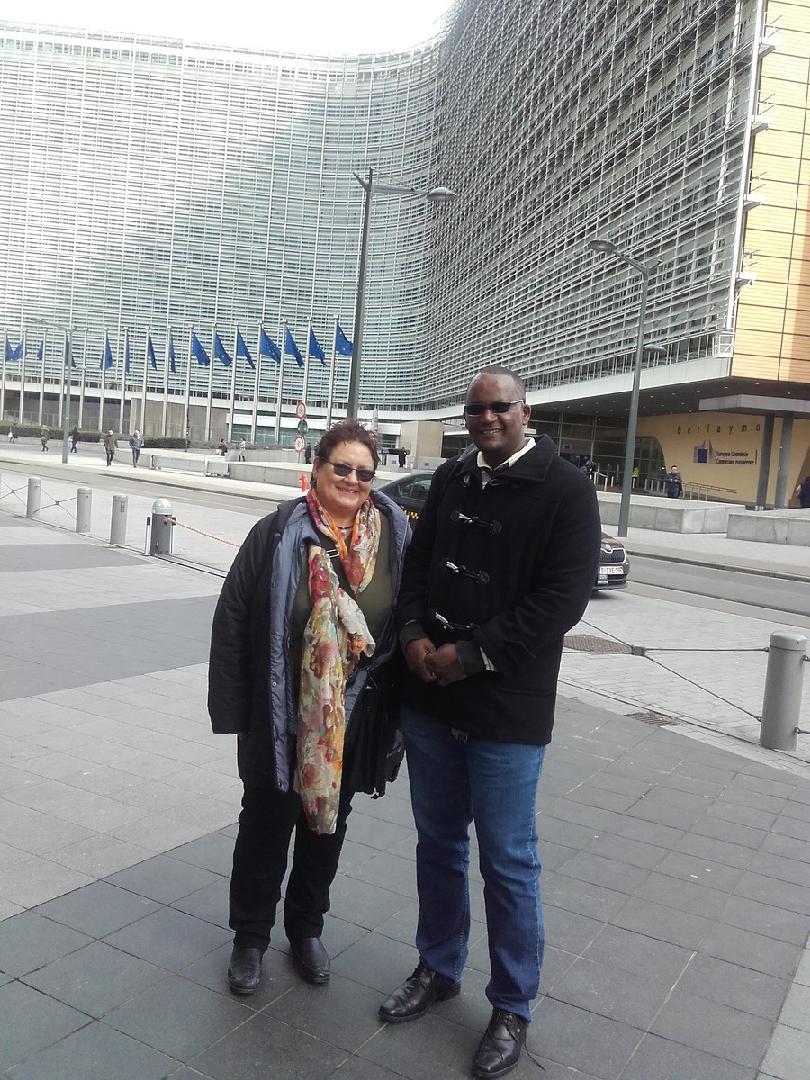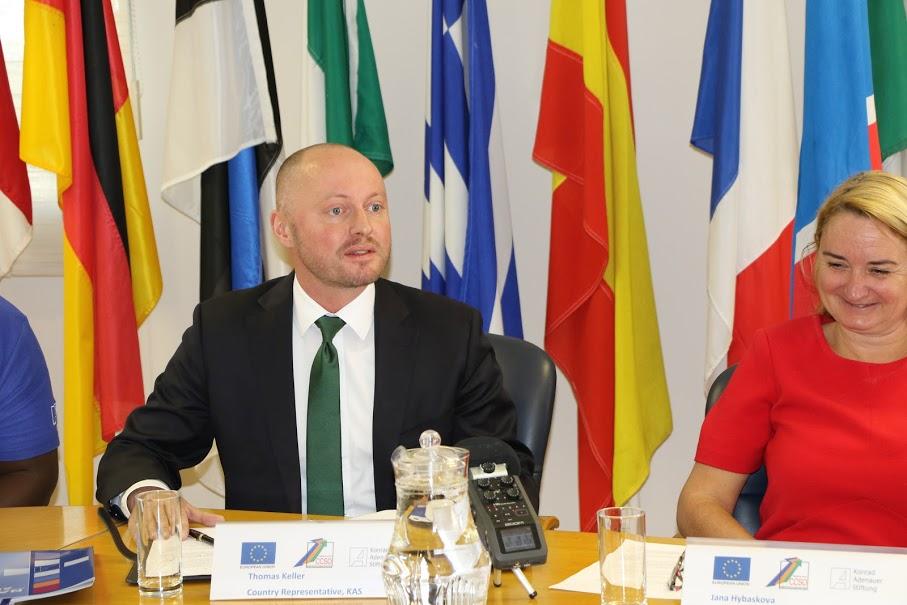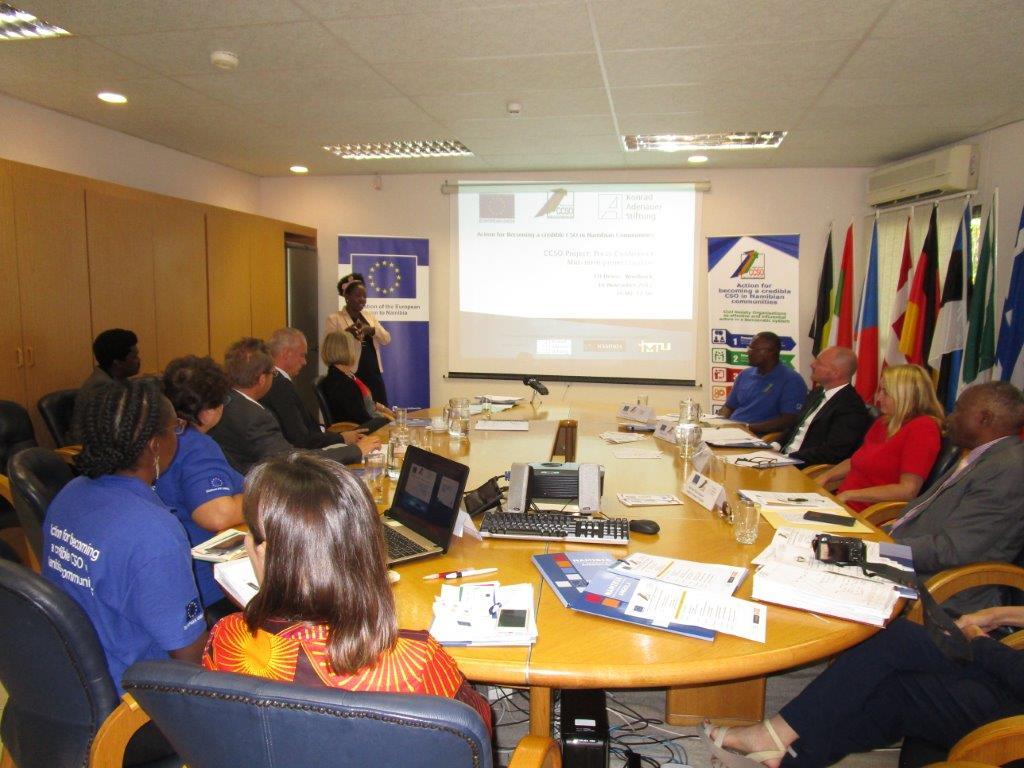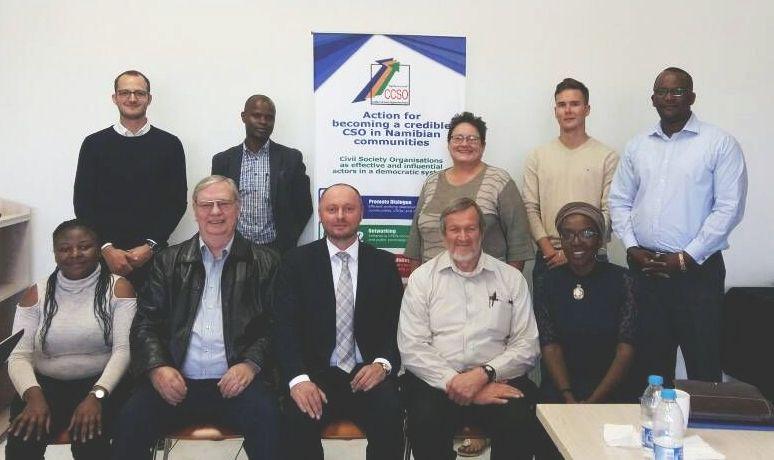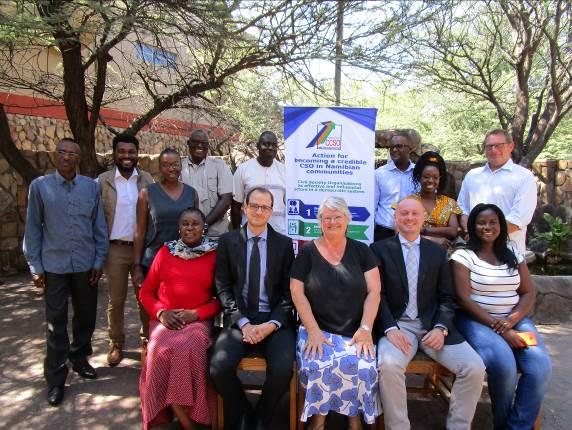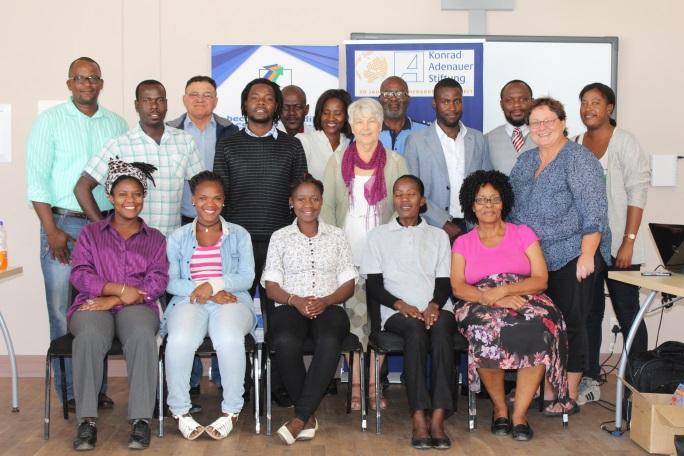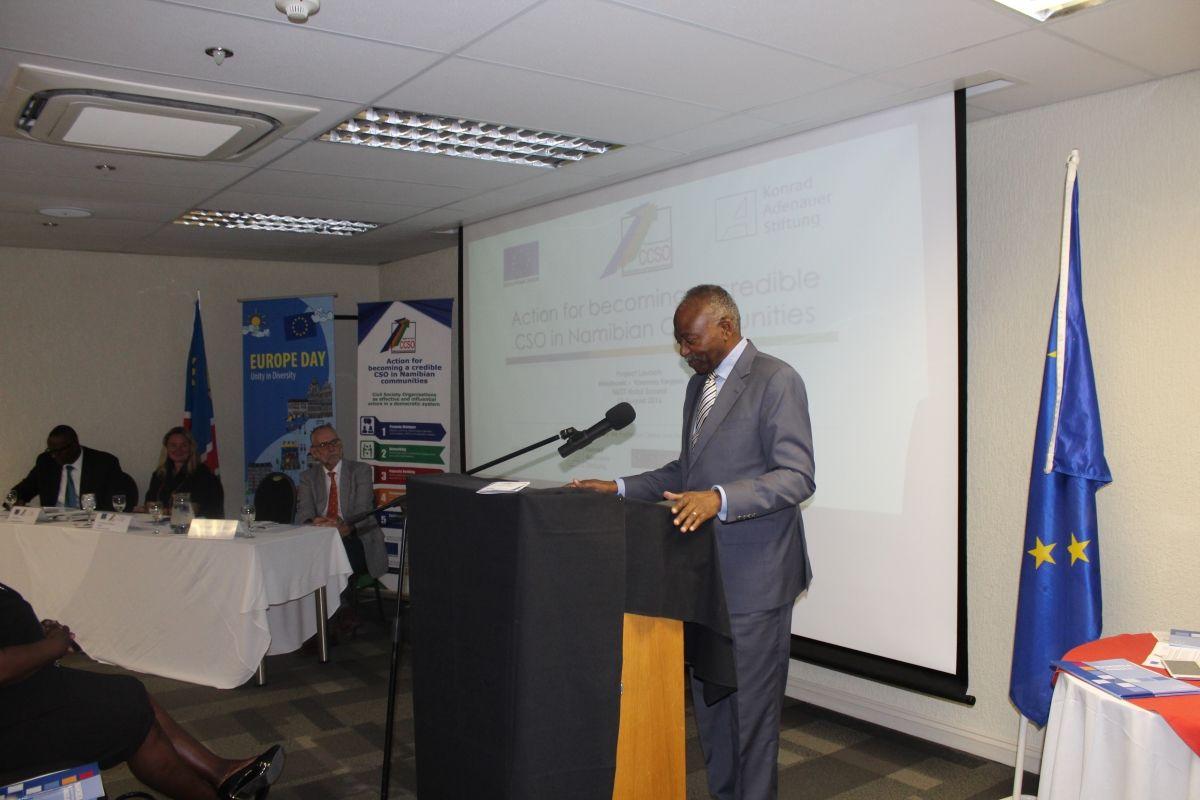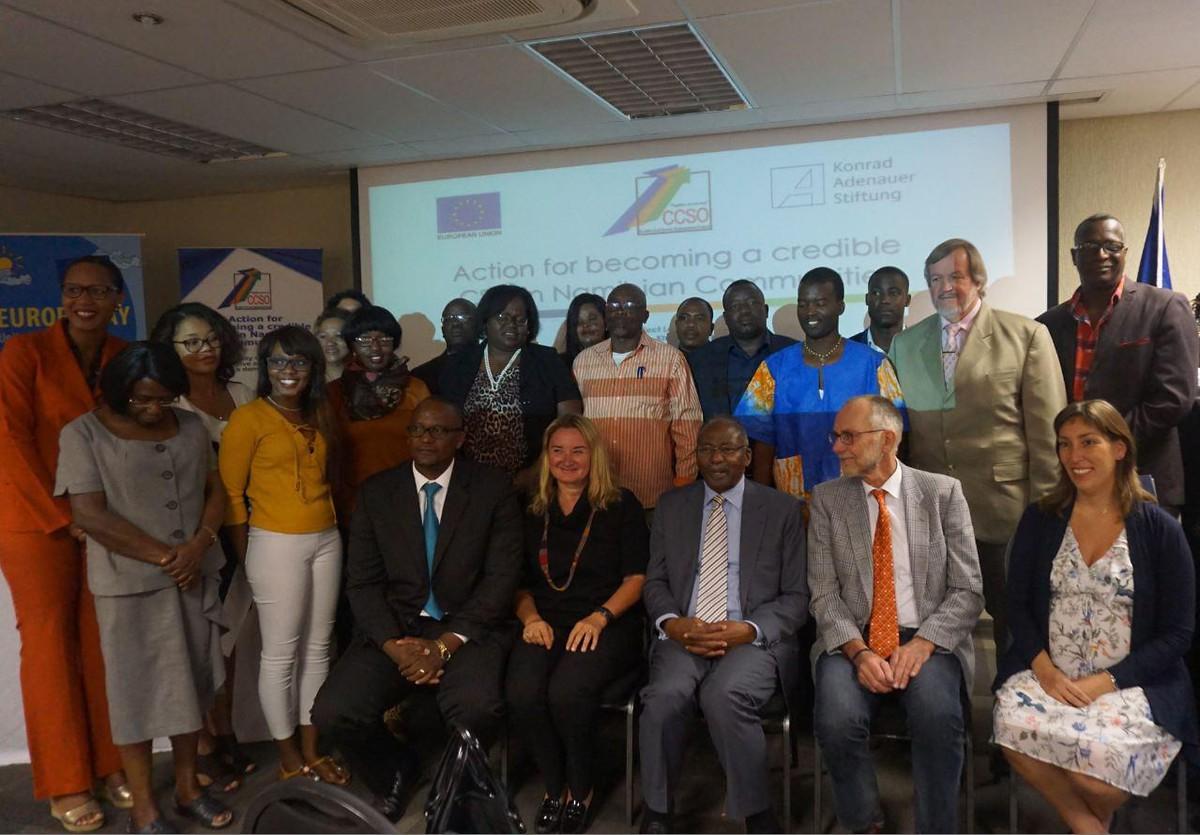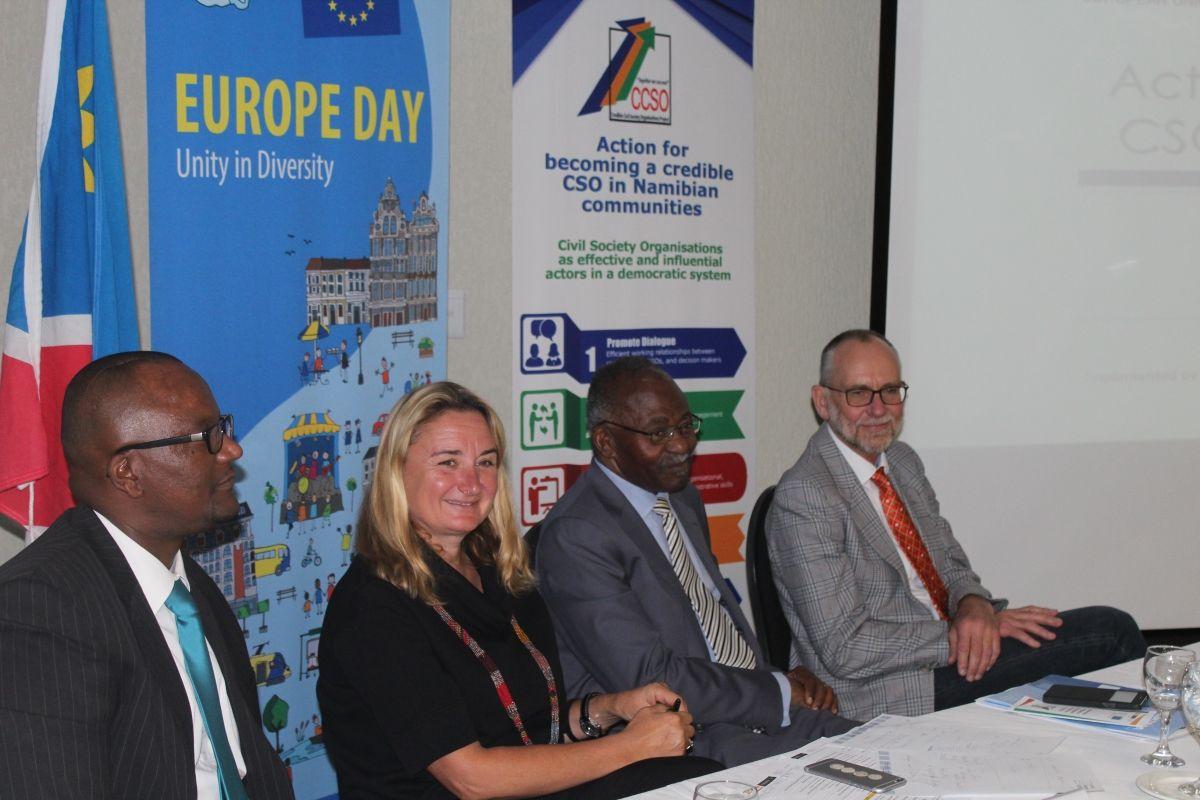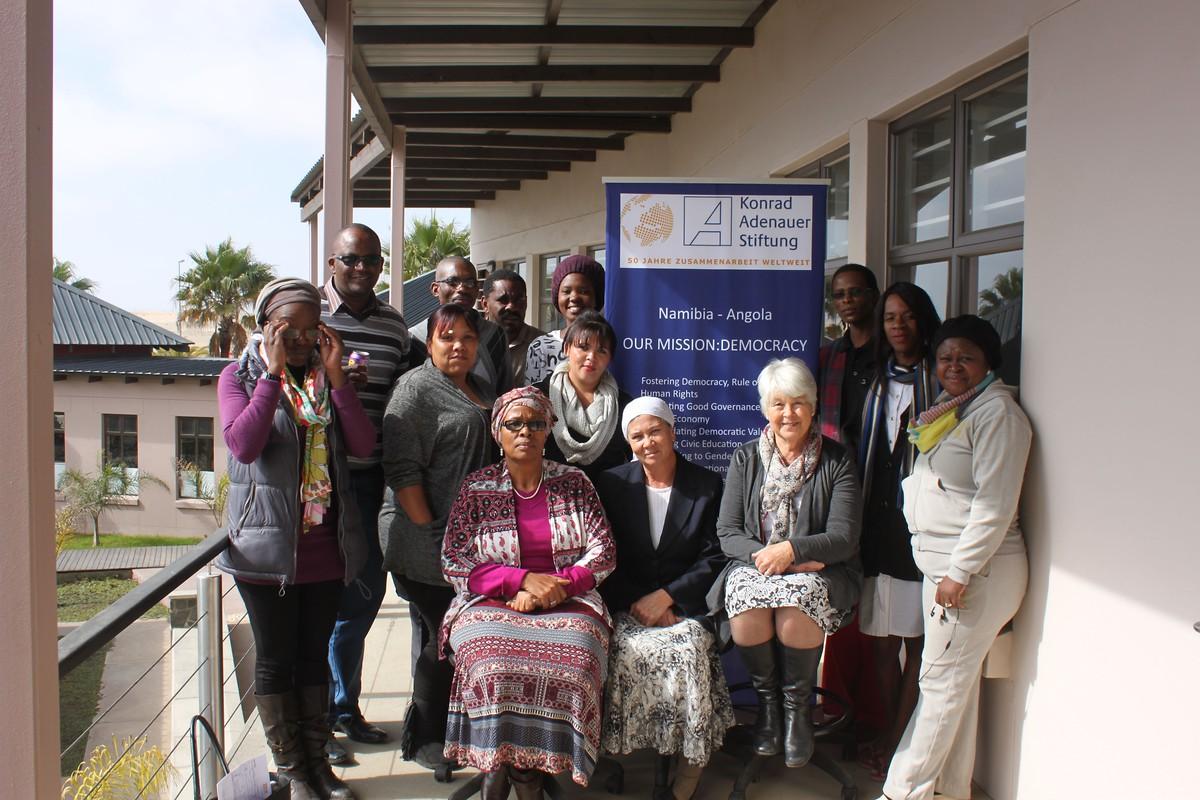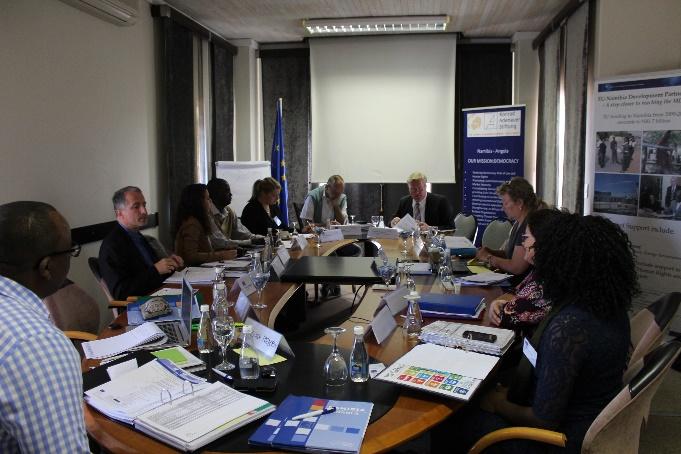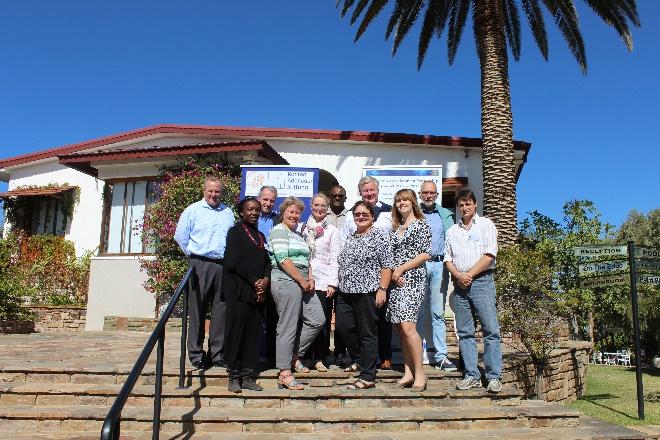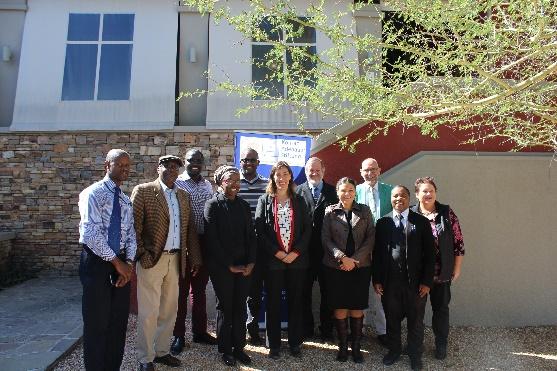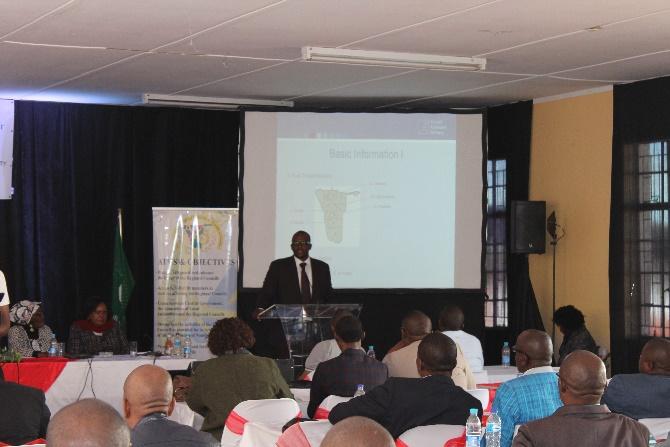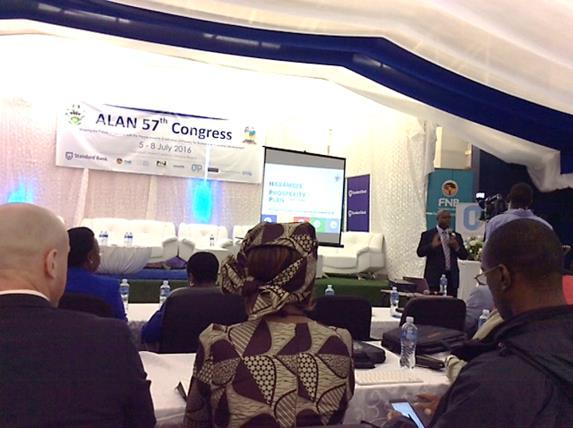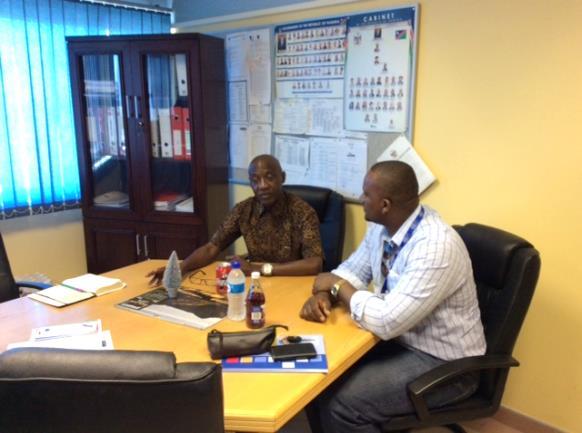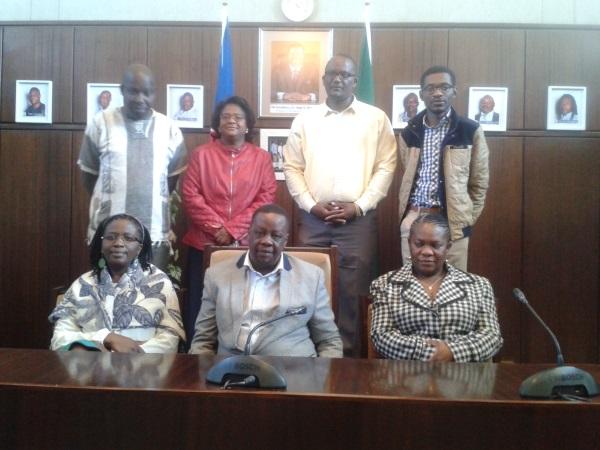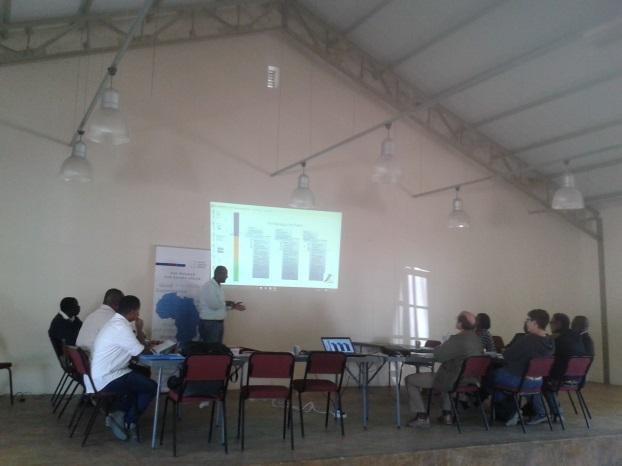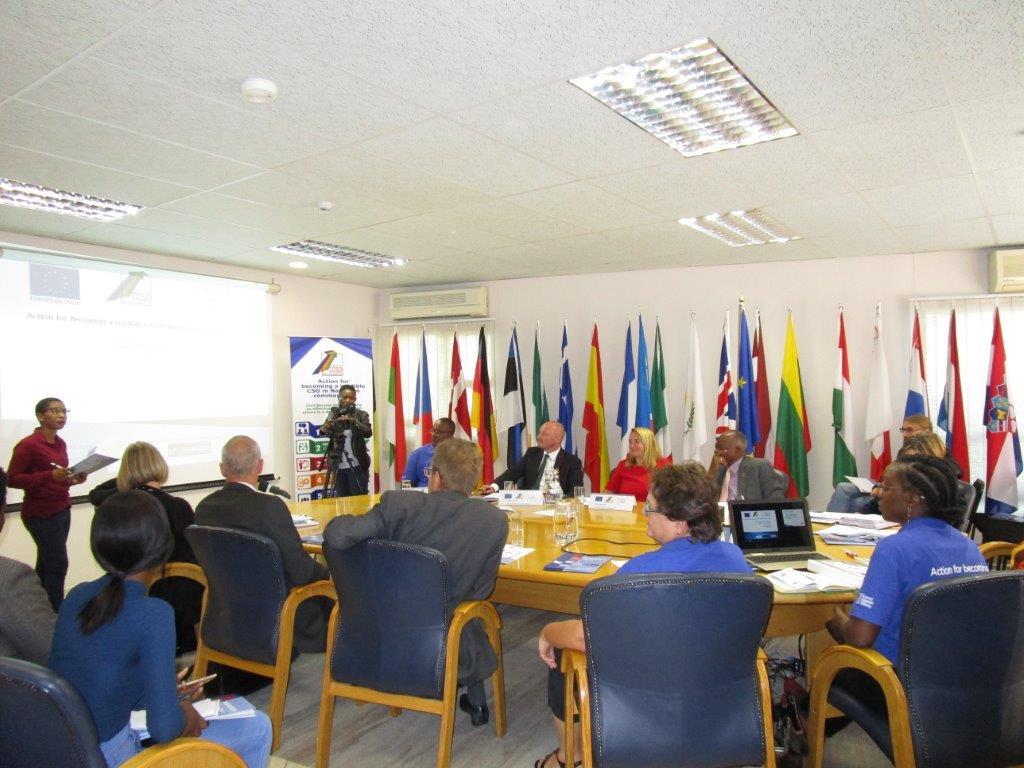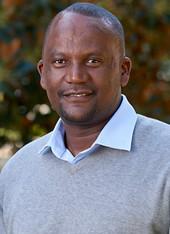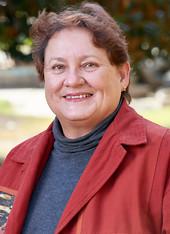Asset Publisher
Strengthening CSO's in Namibian communities
in order to promote inclusive policy-making, improved governance and greater accountability
Asset Publisher
EU-Project: “Action for becoming a credible CSO’s in Namibian communities"
The project started in April 2016 and will run until 31August 2019. It is implemented in five Regions in Namibia: Erongo, Hardap, Omaheke, Oshikoto and Otjozondjupa. It is co-sponsored by the European Union and the Konrad Adenauer Foundation and will have a budget of 749, 281 € (+- N$13 Million). The main goal is to reinforce Civil Society Organisations (CSO) as influential actors in Namibian communities.
The planned interventions cover working with Parliament & elected representatives, capacity building of various selected CSO’s in the targeted five regions, raising public awareness, the production of training programs and materials as well as capacity building sessions and an impact assessment.
Background of the Project:
- Studies show that too many Namibians lack understanding in processes and structures in decentralisation
- At Independence CSO's were very active, but activities declined in the past 26 years due to various factors, mainly funding
- Effective interaction between Civil Society and their constituents as well as their elected representative is weak
- CSO's need to become credible to strengthen internal operations and participate in developmental issues in their regions
Inception Workshop, 24 - 27.05.2016
Over the course of four days, the workshop had an opportunity to discuss and review the project activities, planning, budget, monitoring and evaluation as well as other important matters. The workshop was attended by members of the KAS-Office Namibia-Angola, representatives of the KAS-Headquarter from Berlin and the Head of Department for Sub-Saharan Africa, Andrea Ostheimer, Representatives of the EU and the Project Partners, as well as the Project Implementation Unit (PIU), which consists of the Project Manager - Dennis Zaire, the Project Officer - Naita Hishoono and the Project Accountant - Sonja Poller. The work shop was a great success and the entire team looks forward to the successful implementation of the project over the next three years. The project was officially launched on 19 August 2016 at the Polytechnic Hotel School at 09:00.
First Meeting of the Advisory Group, 21.06.2016
On 21 June 2016, the Project Implementation Unit (PIU) met the members of the CSO Advisory Group (CSOAG)for the first time. After a detailed introduction to the project and its aims and timeframe, the group discussed all remaining questions and the tasks for the CSOAG. The members made good contributions and comments that would assist the successful implementation of theproject.
The CSOAG consists of Jakse Jacobs (ret. Parliament Secretary), Johan De Waal (ret. Politician), Salatiel Shinedima (WAD), Irene Marenga (ARC), Maureen Kambala (ALAN), Nelson Kisaka (National Assembly), Mr. Ephraim Jane (National Council), Jonathan Kambirongo (National Planning Commission), the PIU, KASResident Representative and a representative from the EU.
ARC 7th Congress, 21- 23.06.2016
The Project Implementation Unit (PIU) joined the 7th ARC Congress on 22 June 2016 in Keetmanshoop to introduce the project to the gathered regional decision makers as well as to network.
Following a short introduction to the Konrad Adenauer Foundation, the Project Manager - Dennis Zaire, explained the background and the objectives of the project, as well as the expected results, possible risks and the individual activities to fulfill the goals of the project.
The gathered members showed great interest in the new project and asked to be consulted and informed about the project activities as the project continues.
ALAN Congress, 07.07.2016
Following an invitation by the ALAN-Secretariat, the PIU attended the 57th ALAN Congress in Oshakati, Oshana Region were they presented the project. The PIU used this opportunity to undertake their second regional visit and scheduled meetings with the Regional Councils in Otjiwarongo, Otjozondjupa Region, Tsumeb and Ondangwa, both towns in the Oshikoto Region, before heading to the Congress on June 7th.
During consultation with the regional leadership of the two respective regions, the team took the opportunity to present the new CCSO Project. The congress was attended by all 57 Local Authorities as well as the Minister of Urban & Rural Development, Hon. Sophia Shaningwa, the Minister for Economic Planning, Hon. Tom Alweendo, Minister for Economic Planning & Director General, Mr. Albertus Aochomub, Presidential Press Secretary, Hon. Margareth Mensah-Williams, Chairperson of the National Council, including ALAN’s counterparts from Botswana and South Africa also attended.
On 19-20 June 2016, the PIU started with the setting up of a regional structure in the Omaheke Region. During the two days the team met with the Omaheke Regional Council as well as members of the civil societies (CSO’s) in Omaheke. The meetings where extremely fruitful as many regional issues were discussed. The second meeting of the CSO’s in Omahekewas scheduled for 23 August 2016 in Gobabis.
On 25-26 July 2016, the PIU went to Swakopmund to set up the Erongo regional structure. The meeting with the CSO’s in Erongo Region took place on 25 June 2016 at the COSDEF Centre in Swakopmund. The meeting was a success and a follow up meeting is scheduled for 16 August 2016.
The next region to be visited by the PIU was the Hardap Region. The team visited the region on 28 – 29 July 2016. The meeting took place at the Catholic Parish Mission Hall in Mariental.
Otjozondjupa and Oshikoto regionwherealso visited to set up the CSO structures.
CCSO Project launch, 19.08.2016
On 19th August 2016 at the Polytech Hotel School, the CCSO project was officially launched jointly by the Speaker of the National Assembly, Hon. Prof. Peter Katjavivi, and the EU Ambassador H.E. Jana Hybaskova. Both speakers underlined the importance of civil society in a democratic system. They indicated that civil society has a critical role to play in society and in assisting government in bringing services to the people. The launch was attended by Councilors, civil society practitioners, media and implementing partners. The launch also served as an interaction between the experienced speakers and civil society practitioners as well as the media.
Third regional visits - Strategic Plans
Between 12-25 October 2016, the PIU visited the five regions to discuss Strategic Plans and the meaning of credibility to the participating CSO's. Input was received and CSO's participated well in discussions.
CCSO project 2017 regional visits
Action for becoming a credible CSO in Namibian communities (CCSO) is a EU–KAS sponsored project. Its overall objective is to positively contribute to an accountable, transparent and participatory democracy in Namibia in accordancewith the Namibian Constitution.
During February and March 2017, the CCSO commenced with its activities for the year by visiting civil societies and regional authorities in its 5 target regions of Erongo, Omaheke, Hardap, Oshikoto and Otjozondjupa. Discussions on cooperation between civil societies and regional authorities were on the agenda. Development matters and update on regional development priorities and how CSO’s could join regional decision-making structures such as the CDC’s also featured strongly. During the visits, participants learned about strategic plans, separation of powers and the Namibian Constitution. Issues were collected and assimilated in a report to the Office of the Speaker and the EU Ambassador as part of the effortto link CSO’s with higher authorities.
Training of Trainers (TOT)
During the week of 2-7 April 2017, the CCSO projectheld a successful training of trainers (ToT) workshop at Rock Lodge, just outside Okahandja, Otjozondjupa region. Eight potential shortlisted trainers participated and went through an intensive one week course. The course covered 3 modules: organisational and administrative skills; operational skills; and public participation and engagement skills. Following the TOT workshop, five trainers were ultimately selected and appointed as Master Trainers for the CCSO project for the first six months for Modules 1-3. The five selected Master trainers are highly experienced and some of the best in the field and were allocated one region each in which to train.
First round of trainings was a great success
Following the successful ToT workshop, the CCSO project commenced with trainings for Module 1 in May 2017. Module 1 titled Organisational and Administrative skills covers decentralization, governance, managing effective meetings, record keeping, team work, public speaking and presentation skills as well as working with local communities. Training evaluationsdemonstrate that a good level of new knowledge was acquired by participants. The trainers performed well and displayed their best skills during the workshops. Module 2, which covers operational skills, commenced on 3-7 July 2017 with the first training in the Omaheke region.
Third CSOAG meeting held
The CCSO project held its third meetingwith the project steering committee, theCivil Society Organisations Advisory Group (CSOAG). The CSOAG reviews and advises the project implementation team. It consists of highly experienced volunteers from across the industry. During this meeting, the project implementation team provided an overview of the last six months since the last CSOAG was held in November 2016. The reporting covered activities implemented, financial reporting, successes, challenges, solutions to obstacles, overall project implementation thus far, and the way forward. The meeting provided good input on the way forward to the implementation team, promising abrighter future for the CCSO project.
Third round of trainings successful
The third round of trainings (Module 3) covered Public Participation and Engagement Skills. Trainings took place between October and November 2017. All trainings were successfully implemented with good participation and display of skills acquired from previous trainings (Modules 1&2). However, this time attendance in the Hardap region, was low due to various factors that came into play. Overall, trainings concluded on ahigh note with participants appreciating the skills they have acquired from the various trainings. Module 3 was the last trainings for 2017. Further trainings commenced in February 2018.
M&E outreach to CSOs
During October and November 2017, the CCSO project went to visit participating CSO’s in the five regions as part of the Monitoring and Evaluation (M&E). The purpose of the visit was to evaluate the CSO's progress, determine if they implement the skills acquired from trainings, whether they have the necessary structures in place, and if strategic plans, guiding documents and policies are in place. The evaluations reached 29 CSO’s in the five target regions. Evaluations revealed goodresults and successesas well as areas to improve. Challenges faced by CSO’s also came out strongly. The findings of the M&E informed the project on further action to take.
Nov 2017: Mid-term project update - Press Conference
18 months have passed since the CCSO project was launched in August 2016. The project organized a press conference to provide a ‘mid-term update’, on how the project has fared over the past 18 months. The press conference covered activities implemented, meetings held with various stakeholders, partnerships formed, opportunities and challenges incurred, lessons learned and the way forward for the project. The main findings highlighted by the press conference were that the projectwas being successfully implemented. That it had a positive impact on the civil societies and communities in the five target regions, that 66 civil society organizations benefitted from the trainings and activities of the project so far. The press conference was well attended including participating civil society organisations from the regions; members of the project advisory group (CSOAG); the Hon. Speaker of the National Assembly, Prof. Peter. Katjavivi; the EU Ambassador, Jana Hybaskova; as well as other dignitaries and the press. The project received good coverage in the media. Please follow the link to listen to the podcast - https://iono.fm/e/502669
Thank you,Merry Christmas & 2018
The CCSO project wishes to thank our five trainers, Mr. Jaco van Rensberg, Mr. Mekupi Tuyendapi, Mr. Theo Ngaujake, Mrs. Ndahafa Nantanga and Mr. Kavena Hambira for their hard work and willingness to share their expertise with us, the CSOs and the communities. Your efforts have contributed to building a better Namibia for all our people and those to come many years from now. We wish you all, as well as our CSOs and partnersa Merry Christmas and a prosperous 2018. May God bless you all.
Way forward for 2018
2018 was an important year for the project. Many activities took place during the course of the year. The training of trainers (TOT) for Act. 3.5-3.7was conducted at the end of January 2018 and training activities commenced soon after the TOT.
The project Implementation Unit wishes to thank the regional leadership of all the five targeted regions for their cooperation and support in the implementation of the project. The participating CSO are equally valued for their contributions and involvement in the project.
Project Management Training
The Project implementation Unit (PIU), Ms. Sonja Poller and Mr. Dennis Zaire received two consecutive trainings on Project Management in Brussels and Berlin, in March and June 2018 respectively. The training was conducted over a period of one week and was attended by Project Managers and Coordinators from other African and European Offices. The training was a success and enhanced the skills of the participants.
Module 4 training: Enhanced Strategic Thinking, Analytical and Advocacy Skills
This training module was implemented in the five regions as follows:
20-22 February'18 - Hardap & Erongo at Swakopmund; 9-11 April '18 - Omaheke at Gobabis;16-18 April '18 - Otjozondjupa at Otjiwarongo; 23-25 April'18 - Oshikoto at Okashana RDC. The training was a success and participating CSO's appreciated the training. Tests and evaluation done after the training showed that knowledge transfer has taken place.
Module 5 training: Enhanced lobbying skills for CSO leaders
The training was conducted in Windhoek. CSOs that made progress with their strategic plans, and submitted their founding documents and that have demonstrated continuous progress over the last two years participated. As the project aim to capacitate CSOs, it is imperative that CSOs also demonstrate and show clear evidence of progress, this is what necessitated the exclusion of some CSOs that are either not taking their work seriously or are not showing signs of tangible progress.
The training served as a significant networking session for the various CSOs as different regions where all combined in two trainings (workshops) in Windhoek. The first workshop took place on 10-12 July 2018 at Roof of Africa; and the second workshop took place on 16-18 July 2018 at the same venue. As the participants also stayed at the same hotel, this was a great opportunity for CSOs to discuss, share experiences and create important networks. The training was conducted by Mr.John Hazam, a highly experienced trainer.
CSOAG Meetings
Three CSOAG meetings have so far taken place during 2018. The CSOAG is an independent structure to which the Project Implementation Unit report. The structure is comprised of highly skilled people from various professional backgrounds who offer the project valuable advice freely. The CSOAG members are volunteers who offer their valuable time for a good community course. The PIU highly appreciate their valuable time and advice.
Regional CSO meetings
During the month of September 2018, the Project Implementation Unit (PIU) travelled to all the five regions to implement the regional meetings for CSOs. The meetings are a platform where CSOs jointly discussed progress, activities, challenges and the way forward for their organisations. It is a way for CSOs to share experiences and best practices from their organisations. The meetings also served as apreparations for CSO's to meet with Parliamentary Committee's. The meetings are hosted by the CCSO project.
CCSO Project extended
The CCSO project has been extended with five months to 31 August 2019. During the extension period, more attention will be paid to repeating Modules 1-3 training to the CSOs that missed the previous round of trainings; mentoring and support to CSOs and also recording best practices will receive attention during the extension period.
September to November 2018
During this period, Regional meetings were held in the regions during September 2018. Module 1 repeat - Organisational and Administrative skills took place on 15-19 October 2018 in Swakopmund, Erongo region. Module 2 repeat - Operational skills took place on 22-26 October 2018 at Waldof School in Windhoek, Khomas region.
A Press Conference was held on 16 November 2018 in Okahandja at the Good Samaritans Network (OSN), one of our participating CSO's. The press conference provided an update on project implementation during 2018. The Speaker of Parliament Prof. Peter Katjaviviand the EU Ambasador Jana Hybaskova attended the event. At the event the speaker of Parliament indicated that " I am happy that the project continues tomake an impact in the community through strentherned CSO's. I can see that the people who have participated in this project are well trained and the results are clear from their presentations".
February 2019
The CCSO project commenced theyear 2019with a visit to the CSO's to mentor and support them. The visit was combined with a one day regional meeting of CSO's. Mentoring and support continues to make an impact in the CSO's operations in guiding them through sharing of advice and best practices. It was clear from the visit that visible improvements of CSO's work are recorded in certain cases while others need more support. Lack of access to sustainable funding continues to hamper the work ofCSO's. Cooperation with regional authorities have improved in some areas, while others continues to be work in progress.
During the weeek of 18-22 February 2018, selected members of the CSO's received training on Modules 2-3as trainer of trainers (TOT). They were selected based ontheir progress over the last three years and completence to be trainers. They serve as source of reference for other CSO's and can train others beyond the life of the project.
On 26 February 2019, the PIU met with the Parliamentary Standing Committee on Human Resources and Community Development, to brief them about the progress of the project, as well as lobby them for support in meeting and working with the CSO's.The committee expressed deep appreciation of thegood work done by the project as well as the empowerment of CSO's. The committeedemonstrated keen interest in working with CSO's and receiving regular updates. A CSO list and project presentation was shared with the committee.All communications should be send to:
Konrad Adenauer Foundation (KAS)
EU-CCSO Project
P. O. Box 1145
Windhoek
T: 061-225-568
F: 061-225-678
E: dennis.zaire@kas.de; claudia.gossow@kas.de
February – June 2019
Project Implementation Unit (PIU) brief Parliamentary Standing Committee’s
On 26 February 2019, the PIU consulted with the Parliamentary Standing Committee on Human Resources and Community Development at Parliament. Similarly, a meeting took place on 19 March 2019 with the Parliamentary Standing Committee on Management of Natural Resources; and on 1 April 2019 another meeting with the Parliamentary Standing Committee on Gender Equality, Social Development and Family Affairs. All three committees were updated on the achievements of the CCSO Project since its inception in May 2016. Challenges and opportunities of the CSOs were discussed at length. The meetings sought to create awareness among the Parliamentary Standing Committees on the role and work of CSOs in the five target regions respectively. The PIU requested that the committees consult CSOs during their oversight visits and when hosting public hearings. The committees expressed their gratitude in being informed on the progress of the project and the support it is rendering the CSOs. All three committee’s agreed to meet the CSO’s representatives in Windhoek.
CSOs meet Parliamentary Standing Committees
On 16 April 2019, 23 CSO representatives met with two Parliamentary Standing Committees jointly and introduced their main areas of operation to the committees. The committees welcomed the CSOs representatives to Parliament and expressed their gratitude concerning CSOs involvement in enhancing community development. Hon. Elma Ndienda addressed CSOs as follows: “We are very happy that you are all doing such great work in our communities. Thank you all and continue to work hard as our people need you always. I encourage you to write to us and tell us about your issues. We will come to you, if necessary”
On 18 April 2019, 14 CSO representatives received training on, “improving the relationship between CSOs and the media, with specific focus on radio”. At the same event, CSOs were also introduced to, “how to set up a Facebook page, how to use an email and Instagram”. This training was essential in equipping CSO representatives with social media skills to help improve their visibility and sustainability in the long term.
PIU meets the National Council Vice- Chairperson and addresses the National Council MPs
On 8 April 2019, the PIU met with the Vice Chairperson of the National Council Hon. Bernhard Sibalatani and briefed him on the CCSO project. Hon. Sibalatani asked that the PIU address the National Council MP’s jointly. Meeting individual National Council committees was also discussed. Hon. Sibalatani offered his office assistance in facilitating the meetings with individual committees. The PIU is grateful and thanks Hon. Sibalatani for his generous assistance to the CCSO project.
On 13 May 2019, the PIU addressed a full chamber of the National Council of 43 Members of Parliament (MP) and 7 staff on the CCSO project. 13 CSO representatives from the five regions attended the session. The MPs were impressed with the work of the project. This was a valuable experience for the CSO representatives to attend the meeting and for many of them it was the first visit to the Namibian Parliament and to meet their MPs.
CSO representatives meet the National Council Committees
On 14 May 2019, 13 CSO representatives met the National Council Standing Committee on Public Accounts and Economy. The CSOs introduced their work and communicated their achievements and challenges to the committees. The committee chairperson, Hon. Peter Kazongominya, a regional councilor from Omaheke region concurred and subsequently visited one of the CSOs, namely Take Hands Together from Leonardville. Hon. Mupetami, also a councilor from Oshikoto agreed to look into the issue of water shortages at Omuntele as brought to the attention of the committee by Tate Phillemon from Omuntele Farmers Association. These two instances represent success and demonstrate the great potential that exists if the cooperation between Parliamentary Committees and the CSOs is enhanced.
On 22 May 2019, more CSO representatives met the National Council Standing Committee on Habitat. The committee expressed their happiness to receive the visit from the CSO representatives and hear about their community work. The MP’s expressed willingness to work closely with the CSOs and consult them during their outreach programmes.
Since the CSO’s meetings with the various standing committees, two CSOs wrote to the committees and two CSOs were visited by the MPs. This gives hope for better and cordial working relations and consultations between the committees and the CSOs, even beyond the life of the CCSO project.
8th CSOAG meeting
On 4 June 2019, the CSOAG meeting took place and offered the PIU an opportunity to report on the status of the project. Previous and current activities were discussed. The meeting was dominated by discussion on the status of the stagnant “Government of Republic of Namibia Civic Organisations Partnership Policy-December 2005”. There was overwhelming consensus that there is a need for the National Planning Commission to do further consultations urgently so that the policy could be revised for implementation for CSOs to start reaping the benefit from it.



